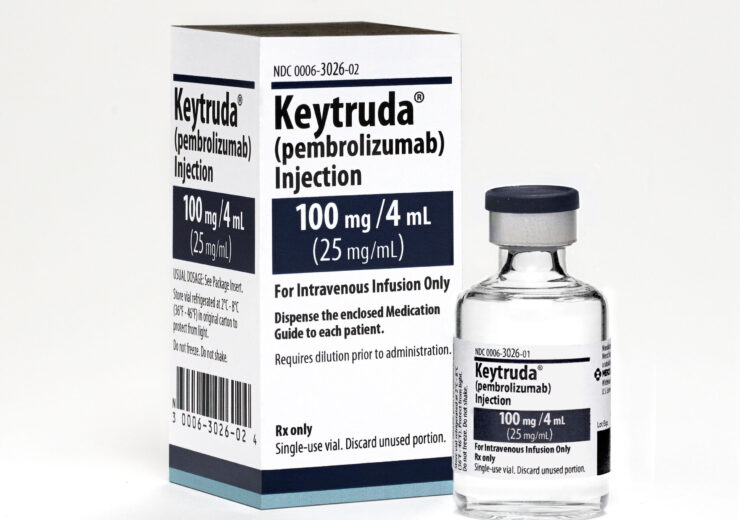Keytruda plus Lenvima combination is currently approved in Japan, the US and Europe to treat certain advanced endometrial cancer types

Keytruda 100mg/4mL Vial and Carton 2015. (Credit: Merck Sharp & Dohme Corp.)
Japan’s Ministry of Health, Labour and Welfare (MHLW) has approved Merck’s Keytruda in combination with Eisai’s Lenvima to treat a type of uterine cancer (endometrial carcinoma).
The drug regimen was indicated for patients with unresectable, advanced, or recurrent endometrial carcinoma that continued to progress after chemotherapy.
Keytruda is an anti-PD-1 therapy that works by harnessing the ability of the body’s immune cells to detect and fight against cancer cells.
It is a humanised monoclonal antibody that blocks the interaction of PD-1 with its ligands, to activate T lymphocytes, which may harm both tumour cells and healthy cells.
Lenvima is an orally available multiple receptor tyrosine kinase inhibitor, discovered by Japanese pharmaceutical company Eisai.
It works by preventing the kinase activities of vascular endothelial growth factor (VEGF) receptors VEGFR1 (FLT1), VEGFR2 (KDR), and VEGFR3 (FLT4), among other kinases.
In March 2018, Eisai and Merck signed a strategic collaboration agreement to jointly develop and commercialise Lenvima worldwide.
The two companies agreed to jointly develop, manufacture, and commercialise Lenvima, both as monotherapy and in combination with Merck’s Keytruda.
It is the first time for Keytruda plus Lenvima combination to be approved in Japan.
The combination is currently approved in Japan, the US and Europe to treat certain advanced endometrial cancer types.
Merck research laboratories clinical research vice president Gregory Lubiniecki said: “Rates of endometrial carcinoma have been steadily increasing in Japan each year, and there are limited options for patients who are diagnosed at an advanced stage or find their disease has returned.
“With today’s approval, patients in Japan with unresectable, advanced or recurrent endometrial carcinoma now have the option of the first immunotherapy and tyrosine kinase inhibitor combination that has significantly improved overall survival and progression-free survival compared to chemotherapy.”
The MHLW approval is supported by results from the Phase 3 KEYNOTE-775/Study 309 trial in 827 patients with advanced endometrial carcinoma.
In the study, the drug regimen showed statistically significant improvements in overall survival (OS), by reducing 38% risk of death.
Also, the combination showed improved progression-free survival (PFS), by reducing the risk of disease progression or death by 44%, compared to chemotherapy.
The most common adverse reactions include hypertension, hypothyroidism, diarrhoea, nausea, fatigue, proteinuria, vomiting, and arthralgia, among others.
Merck and Eisai are planning to study the Keytruda plus Lenvima combination across various other cancer types, beyond advanced endometrial carcinoma.
The companies have jointly initiated new clinical studies of the combination through the LEAP clinical programme, in more than 10 different tumour types.
Eisai Japan president Terushige Iike said: “This is the first approval of the KEYTRUDA plus LENVIMA combination in Japan.
“We thank the patients, families and healthcare providers who made this approval possible. By delivering this combination therapy, we are proud to provide patients with advanced or recurrent endometrial carcinoma an additional treatment option.”
